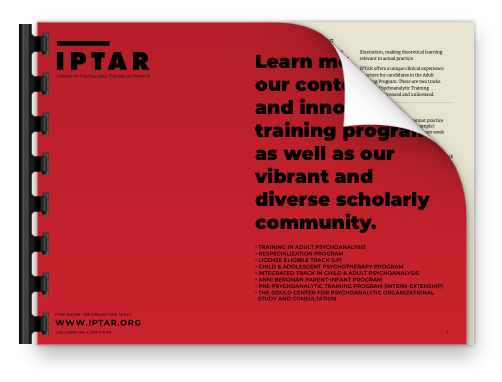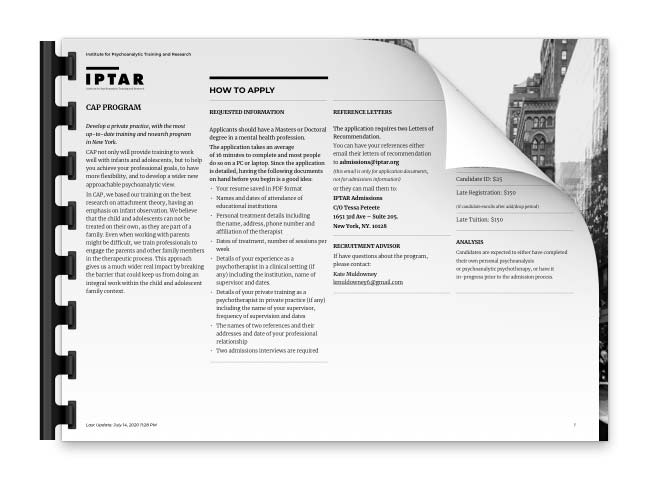Child and Adolescent Program
Training in Child and Adolescent Psychotherapy (The CAP Program)
IPTAR’s innovative certificate program in Child and Adolescent Psychotherapy offers a contemporary, psychoanalytic perspective on work with children, adolescents and their families. The program focuses on psychotherapy, play therapy and working with parents/caregivers while integrating advances in the fields of child development, neuropsychology, trauma, diversity and infant–parent research. The program consists of two years of coursework and a clinical component.
Our program is designed for licensed mental health professionals as well as candidates in adult psychoanalytic programs (working towards LP) who wish to gain a greater psychodynamic understanding of children and adolescents and deepen their own capacities to practice psychotherapy. The program is complementary to IPTAR’s Training Program in Adult Psychoanalysis. It is possible to enroll in both simultaneously. Candidates from other analytic institutes are also welcome to apply.
Upon completion of the program candidates will receive a certificate in Child and Adolescent Psychotherapy.
Introduction to CAP
Child and Adolescent Program is now offering one year introductory program to child and adolescent psychotherapy. Program consists of four introductory courses offered weekly and it is open to clinicians and candidates in all stages of training. This is an opportunity to learn about working with children and/or about those aspects of childhood that can significantly inform your work with adults.
If you choose to enroll into CAP certificate program the coursework taken in the introduction to CAP will count towards your credits.
Follow us in social media
Deadline for Applications
A completed application must be received before:
CAP Program application deadline is June 1, 2023
Late applications will be considered as space is available.
Schedule
IPTAR operates on a quarterly academic schedule, with two eight-week courses offered each quarter for each program. Some classes may be 16 weeks with a “Part I” and “Part II” spanning two quarters.
The Curriculum
The CAP three-year curriculum integrates theoretical learning with clinical practice. Each 8-week course is held Monday evenings throughout the academic year.
For more information about the CAP program, please download the following CAP Manual
Click to unfold
The First Year
The first year is devoted to learning the fundamentals of performing a psychoanalytic approach with children, adolescents, and their families. It includes courses in assessment; psychoanalytic theory of child and adolescent development; theory and technique of child psychotherapy and play therapy; work with parents; and understanding transference and countertransference.
The Second Year
The Second Year of course work is dedicated to conceptualizing the treatment of a wide spectrum of childhood and adolescent disorders, including psychotic, borderline, narcissistic, autistic, and developmental disorders. The courses on the contributions of D. W. Winnicott and Melanie Klein offer different theoretical perspectives. Specialized courses also include Neuropsychology and learning disorders; using art material in clinical work; a seminar on writing up cases; and loss, mourning, and termination.
Beyond Second Year
Beyond the Second Year we offer a Clinical Seminar and a Writing Seminar designed to support completion of your control work. Clinical Case Seminars focus on deepening clinical work, integrating theory and practice while continuing to offer candidates the opportunity for group supervision.
CAP Faculty and Supervisors
- Aneta Stojnic, Ph.D.
- Daisy E. Alter, Ph.D.
- Christine Apuzzo, LCSW
- Delia Battin, LCSW
- Jill Bellinson, Ph.D.
- Phyllis Beren, Ph.D.
- Susan S. Berger, Psy.D.
- Bettina Buschel, D.A.
- Barbara W. Dorlester, Ph.D.
- Ranny Goldfarb, LCSW
- Carole Grand, Ph.D.
- Rena Greenblatt, Ph.D.
- Laura Kleinerman, M.S.
- Kathy Krauthamer, Ph.D.
- Kate Muldowney, LCSW
- Sally Moskowitz, Ph.D.
- Kate Oram, Ph.D.
- Miriam Pierce, LCSW
- Richard Reichbart Ph.D.
- Carla Bauer Rentrop, Ph.D.
- Marilyn Rifkin, LCSW
- Lynne S. Rubin, Ph.D.
- Madelon Sann, LCSW
- Esther Savitz, LCSW
- Debra Schnall, LCSW
- Susannah F. Shopsin, LCSW
- Phyllis L. Sloate, Ph.D.
- Marjory Slobetz, LCSW
- Donna Roth Smith, LCSW
- Rogelio Sosnick, M.D.
- Sujatha Subramanian, Ph.D.
- Aaron Thaler, Ph.D.
- Elizabeth Tingley, Ph.D.
- Mary A. Tirolo, LCSW
- Ken Winarick, Ph.D.
- Leni Winn, LCSW
- Randi Wirth, Ph.D.
- Visiting Lecturers
- Anne Alvarez Ph.D.
- Christine Premmereur M.D. Ph.D.
- Beatrice Beebe Ph.D.
- Elizabeth Young-Breuhl Ph.D.
- BJ Casey Ph.D.
- Monica Carsky Ph.D.
- Susan Coates Ph.D.
- Aaron Esman M.D.
- Theodore Jacobs M.D.
- Jeffrey M. Halperin Ph.D.
- Alexandra Harrison M.D.
- Trudy Klauber
- Linda Mayes M.D.
- Sally Moskowitz M.D.
- Karen Proner M.A.
- John Rosegrant Ph.D.
- Arietta Slade Ph.D.
- Miriam Steele Ph.D.
- Mary Target Ph.D.
- Edward Tronick Ph.D.
- Biddy Youell
- Kirkland Vaughans Ph.D.
Program Highlights
Clinical Component
The program requires that a candidate complete two training cases under weekly individual supervision. One case must be seen at least once a week for 2 years, and a second case must be seen for a minimum of two times a week for 2 years.
Candidates have the opportunity to treat patients at the IPTAR Clinical Center or On-Site School Programs, or a variety of other settings, including their place of employment and their private practice. Through several different programs such as our On-Site-School Program and the IPTAR Clinical Center, we are devoted to providing pro-bono and low fee therapy to children from underprivileged backgrounds, as well as to the outreach to diverse communities that have historically been underexposed to the advantages of mental healthcare, especially for children and adolescents. Pro bono supervision is offered for these non-training ICC and On-Site School Program cases.
Upon completion of the training cases, a final report is written on one of the cases, followed by a final oral presentation to a committee. An important aspect of the training is the candidate’s personal therapy, which prepares them for clinical work.
CAP Lecture Series
The larger IPTAR community and other interested professionals are invited to these lectures:
- “The Sunday Seminar Series”
Presentations by leading clinicians, theorists and researchers in the field. - “The Child Therapist at Work Series”
A formal clinical case presentation by CAP candidates, graduates, and faculty.
Graduation
Upon successful completion of the program, graduates are awarded with a certificate at the IPTAR graduation ceremony. Graduates of CAP are eligible to become IPTAR Affiliate Members and part of the larger collegial community. IPTAR’s active community offers stimulating conferences, advanced courses and seminars, study groups, special events and a network of referrals.
Admissions
Applicants should have a Masters or Doctoral degree in a mental health profession. Candidates are expected to be in or be prepared to begin or to have completed their own personal psychoanalysis or psychoanalytic psychotherapy. Two admissions interviews are required.
Click to unfold
Deadline for Applications
CAP Program application deadline is June 1, 2025
Information Needed for Application
The application takes an average of 16 minutes to complete and most people do so on a PC or laptop. The application is detailed, and the following documents will allow for an easy process to completion:
- Your resume saved in PDF format
- Names and dates of attendance of educational institutions
- Personal treatment details including the name, address, phone number and affiliation of the therapist
- Dates of treatment, number of sessions per week
- Details of your experience as a psychotherapist in a clinical setting (if any) including the institution, name of supervisor and dates.
- Details of your private training as a psychotherapist in private practice (if any) including the name of your supervisor, frequency of supervision and dates
- The names of two references and their addresses and date of your professional relationship
Reference Letters
The application requests two Letters of Recommendation.
You can have your references email their letters of recommendation to admissions@iptar.org
or they can mail them to:
IPTAR Admissions
C/O Tessa Peteete
1651 3rd Ave – Suite 205. New York NY 10128
Please go to the bottom of this page to complete the application for The CAP Program.
Brochure 2020
The CAP Program
IPTAR’s vibrant psychoanalytic community, reflected in our excellent Training Institute, offers exciting and rigorous programs in psychoanalytic training.
This information sheet will give you an overview of the CAP Program. We invite you to our Workshops at IPTAR series, followed by our Open House receptions.
Contact information for the people who will be present at the open house will be included on the last page of this brochure. You are welcome to reach out to them with any questions you may have before or after our open house.
Co-Directors of CAP Program:
Phyllis Beren and Aneta Stojnić
If have questions about the program, please contact:
Aneta Stojnić
Technical Problems / Support
If you experience any issues with the form, please contact help@iptar.org


